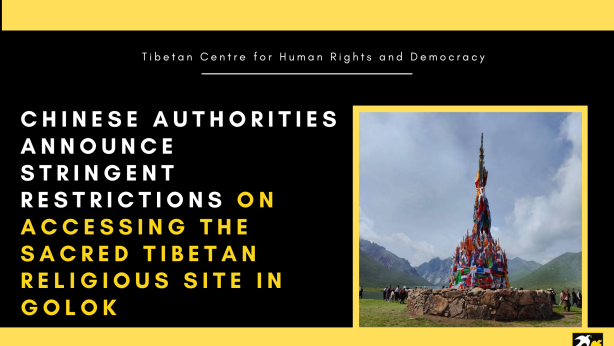China must release Tibetan writer and intellectual Lhaden from prolonged incommunicado detention
The Tibetan Centre for Human Rights and Democracy (TCHRD) demands the immediate and unconditional release of the noted Tibetan writer and intellectual Mr Lhaden (pseudonym: Dhi Lhaden) who has been in arbitrary detention for two years at an undisclosed location in Chengdu city, Sichuan Province.
TCHRD believes that Mr Lhaden’s prolonged incommunicado detention was a reprisal for his peaceful exercise of the right to freedom of opinion and expression. Chinese authorities must uphold its obligations and duties under international law and stop subjecting Mr Lhaden to torture and other cruel, inhuman, and degrading treatment or punishment.
Mr Lhaden was taken into custody by the Chinese Public Security Bureau (PSB) officers in June 2019. The PSB officers detained Mr Lhaden from his apartment in Chengdu before confiscating his laptop, phone and other documents. He was writing a memoir at the time. It was also reported that he was likely detained for using banned teaching materials at a private educational centre where he was working as a teacher.
Information received by TCHRD in March 2020, almost nine months after his detention, revealed that the investigating officers also used TCHRD’s English translation of one of Mr Lhaden’s books, The Art of Passive Resistance, as an evidence of his so-called offence. In deference to the wishes of Mr Lhaden’s relatives that domestic remedies could be pursued for his release, TCHRD withheld the information about his detention.
The incommunicado detention of Mr Lhaden is a worrying sign of the Chinese party-state’s relentless clampdown on dissenting voices targeting Tibetan intellectuals, writers, and cultural figures. Chinese authorities must cease intimidation tactics of spreading fear and silencing those who do not subscribe to the government narrative on Tibet. As Lhaden wrote in the aforementioned book, “The constitution of tyrannical regimes might proclaim citizens’ rights to protest, assembly, free speech, and criticize government officials. But such proclamations are mere facade aimed at either manipulating the people or showing a positive image to the international community. This fact is corroborated by our experience of arrests and torture under various pretexts every time we tried to exercise these so-called rights.”
A close relative of Mr Lhaden who lives in exile and wish to remain anonymous has sent the following message appealing to the international community to make urgent intervention for the writer’s release (paraphrased translation):
“In mid-2019, you were trapped by dark clouds in an iron net, deprived of all freedoms. Without committing any crime, you have to bear the torture of hellhole, forced from your home to suffer in the shadows. Democracy, freedom, equality are words that sound so heartfelt, but they become meek and powerless between the sharp blades of the authoritarian’s sword. You have disappeared for so long, separated from your family and relatives. Separated from your students like a mother is separated from a child, they have become like orphans, lost and directionless, without you. Reeling under such a catastrophe, we have little option but to place all our hopes in the United Nations and human rights organisations [to help release Lhaden].”
Lhaden is a former monk, intellectual, and writer born in 1971 at Dida Village in Pema (Ch: Baima) County, Golog (Ch: Guoluo) Tibetan Autonomous Prefecture, Qinghai Province, in the Tibetan province of Amdo. Popularly known as Dhi Lhaden, his ordained name as a monk was Thubten Lobsang Lhundup. At the age of 13, he became a monk at his local monastery and at 15, he joined the Larung Gar Buddhist Institute in Serta (Ch: Seda) County, Kardze (Ch: Ganzi) Tibetan Autonomous Prefecture, Sichuan Province. At 27, he travelled to Lhasa to pursue further studies at the Drepung and Sera monasteries but had to cut his studies short. Since 2008, he has visited various places in Tibet to experience and record the observations of fellow Tibetans. His first book titled Tsesok Le Trun Pe Kecha (‘Words Uttered with Life at Risk’) was published by TCHRD in March 2011. The book was released to coincide with the third anniversary of the 2008 Mass Uprising in Tibet and the 16th session of the UN Human Rights Council in Geneva. His second book, originally titled Tungol Trimtug (‘Resistance through Cooperation with Law’) was translated into English by TCHRD and published as “The Art of Passive Resistance” on 29 June 2015.


